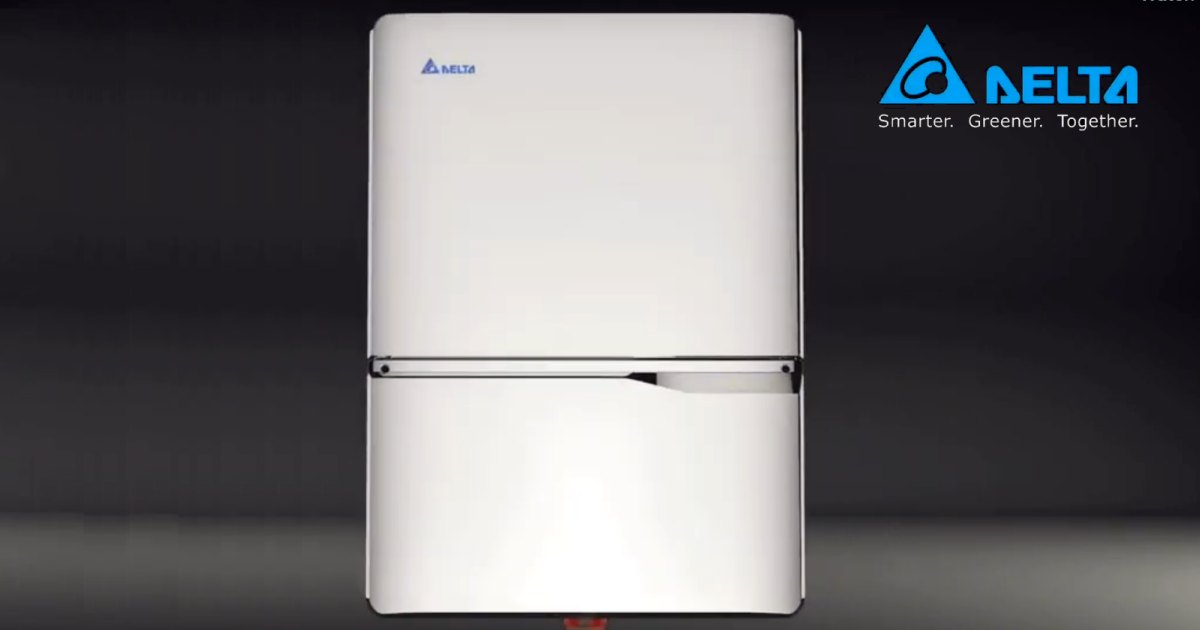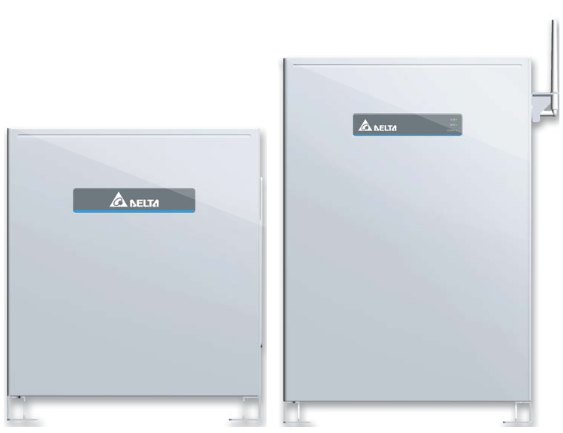
Delta Electronics has new solar products for Australia next year – another battery system and solar inverters with a very interesting feature.
Delta BX6.3 AC Battery
First to the battery system – the BX6.3 was originally showcased at All Energy last year, but release was held off while some further tweaks were made.

Expected to reach our shores in March, the BX6.3 system is an AC-coupled battery that will be available in two forms:
1. A “master” BX6.3 AC battery with 6.17kWh useable capacity that contains the PCS (bi-directional inverter).
2. An added BX6.3-EX (Extension) battery that DC couples to the master battery.
The master battery will support a maximum continuous output of 3kW. When the EX is added it can deliver up to a continuous 4.5kW and usable storage capacity is increased to 12.34kWh.
“The system is ‘grid-forming’, being that it supports AS4777 compliant inverters during a grid failure and we are currently testing third party inverters to confirm their operation,” said Delta Electronics’ Shane Arnold. “If paired with a Delta inverter we can directly control the ramping during grid failure at a faster rate than AS4777, which provides much less throughput on the battery.”
In an AC-coupled configuration Delta has run a 5kW grid tied inverter, a BX6.3AC and BX6.3EX that supported a load of 9.4kW during grid failure conditions over a 2.5 hour duration. This was achievable due to the 5kW inverter running at maximum power output and the battery outputting the other 4.4kW.
The BX6.3 battery is already on the CEC’s approved battery list, and is eligible for the South Australian Home Battery Scheme as well as the Victorian battery rebate. Some further detail on the BX6.3AC and EX can be found here.
Delta H8E and H10E Inverter
The Delta Electronics H8E (8kW) and H10E (10kW) are single phase inverters scheduled to be available in Australia in the second quarter of 2021.
Among their features is rear cable entry for a tidier install, but glands for side and bottom conduit entry are also included. Export control and a consumption meter are incorporated inside the inverter, needing only the CT clamp and cable to be run back to the board.
Other features include an internal ERAC Listed Level 3 DC isolator, natural convection cooling and OTA (Over The Air) firmware updates. The H8E and H10E can also host their own networks where Wi-Fi internet is not available at a site.
Probably the most interesting feature really making the H8E and H10E stand out from the pack is the integrated 4 x MPPT (Maximum Power Point Tracking). It’s pretty common for solar inverters to have 2 built in MPP trackers these days, but this is the first we’ve heard of 4.
Delta said its research indicates this is the only inverter in this class that has 4 x MPPT and notes while there are instances of three trackers where you can parallel input strings, this is still only running 3 x MPPT. Delta decided against parallel inputs and went for dedicated MPPT instead as the company says this makes for much better efficiencies.
What Is Maximum Power Point Tracking?
MPPT is a feature built into grid connected solar inverters to optimise the power output from solar panel arrays under the very rapidly changing conditions they operate in, including shading.
An inverter with multiple MPPT is particularly important when you have solar panels mounted across multiple roof areas where the roof area orientations are different, i.e., they face different directions. An MPPT is required for each array in order to squeeze the best performance from a system as a whole.
You can read a more in-depth description of MPPT here – there’s a bit of technobabble in it, but also a nice analogy towards the bottom of that page for the non-geekish.
Delta Electronics – Quiet And Clever
Delta has been around since the 1970’s. SolarQuotes founder Finn has always been confident in the reliability of Delta Electronics components, resulting from his stint many years ago as a control systems engineer in a UK nuclear power plant where Delta Electronics power supplies were used.
While Delta Electronics’ inverters may not be as widely deployed in Australia as other brands such as SMA and Sungrow, reviews of Delta inverters from Australians who have them installed have generally been positive.
The company is a quiet achiever and has released some really interesting products over the years. One we mentioned back in April this year is Delta’s E5 inverter that can partially power a solar household during a blackout – without a battery.

 RSS - Posts
RSS - Posts



Speak Your Mind